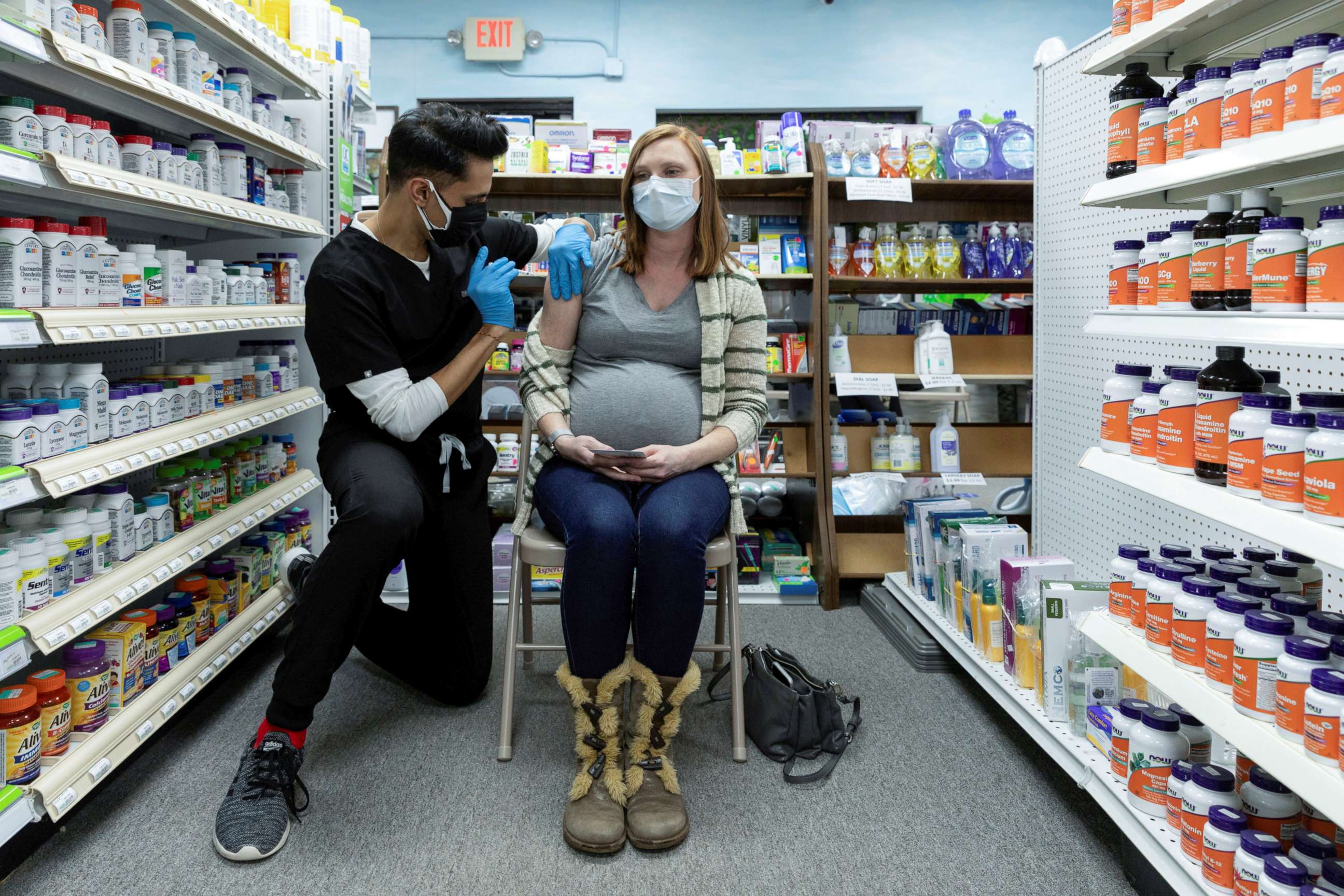CDC strengthens recommendation that pregnant women get vaccinated
The recommendation is based on new safety and efficacy evidence.
The Centers for Disease Control and Prevention on Wednesday announced new evidence that it said strengthens its recommendation that pregnant people get vaccinated.
“CDC encourages all pregnant people or people who are thinking about becoming pregnant and those breastfeeding to get vaccinated to protect themselves from COVID-19," CDC Director Dr. Rochelle Walensky said in a statement about the updated guidance. "The vaccines are safe and effective, and it has never been more urgent to increase vaccinations as we face the highly transmissible Delta variant and see severe outcomes from COVID-19 among unvaccinated pregnant people."
The update is based on further research that found pregnant people can receive an mRNA vaccine with no increased risk to themselves or their babies. Getting the vaccine early in pregnancy poses no increased risk for miscarriage, CDC scientists found, and there are no safety concerns for pregnant people vaccinated late in pregnancy, or for their babies. The CDC has also not found any safety concerns for breastfeeding mothers or people trying to get pregnant.
"In a new analysis of current data from the v-safe pregnancy registry, scientists did not find an increased risk for miscarriage among people who received an mRNA COVID-19 vaccine before 20 weeks of pregnancy. This adds to the growing evidence of the safety of these vaccines," the CDC said.
The data assessed nearly 2,500 pregnant women who received an mRNA COVID-19 vaccine before 20 weeks of pregnancy. While miscarriage typically occurs in about 11-16% of pregnancies, the study found miscarriage rates after receiving a vaccine were around 13%, or similar to the expected rate of miscarriage in the general population, the CDC said.

Until Wednesday, the CDC's guidance for pregnant women was that they were eligible and could get vaccinated. The new guidance, which is that pregnant women should get vaccinated, is armed with more data and safety assurances.
It also comes as the nation sees a significant spike in COVID cases and hospitals near capacity in states like Texas and Florida.
"The benefits of the vaccination strongly outweigh any potential or known risks of vaccination," Sascha Ellington, an epidemiologist and team lead for the Emergency Preparedness and Response team in CDC's Division of Reproductive Health, said in an interview with ABC News on Wednesday.
"We haven't found any risks of the vaccination specific to pregnancy, and we know that if you get COVID in pregnancy you're at higher risk for getting sicker and having worse outcomes. And so for those reasons you should be vaccinated," Ellington said.
Pregnant women are more likely to be hospitalized and need critical care, including ventilation and admission to the intense care unit (ICU), according to the CDC, and COVID-19 during pregnancy increases the risk for preterm birth of the infants -- a birth that is three or more weeks ahead of the expected due date.
But currently, the rate of vaccination among pregnant women is very low. Just 23% of pregnant women received one dose of a vaccine during pregnancy as of July 31, per CDC data.
That low vaccination rate, pared with the rapid spread of the delta variant, has led to an uptick in cases and hospitalizations for pregnant women, Ellington said.
"With such a low vaccine uptake, there's a lot of room to increase this and potentially save lives, protect women from COVID-19," Ellington said.
Last week, two of the nation's leading women's health organizations, the American College of Obstetricians and Gynecologists (ACOG) and the Society for Maternal-Fetal Medicine (SMFM), came out in full support of vaccinations for pregnant women.
"ACOG is recommending vaccination of pregnant individuals because we have evidence of the safe and effective use of the vaccine during pregnancy from many tens of thousands of reporting individuals, because we know that COVID-19 infection puts pregnant people at increased risk of severe complications, and because it is clear from the current vaccination rates that people need to feel confident in the safety and protective value of the COVID-19 vaccines," ACOG president Dr. J. Martin Tucker said in a statement. "Pregnant individuals should feel confident that choosing COVID-19 vaccination not only protects them but also protects their families and communities."
Both ACOG, a national membership organization for more than 60,000 OBGYNs, and SMFM, a global organization with more than more than 5,000 physicians, scientists and women's health professionals, previously recommended that pregnant people have access to vaccines and should "engage in shared decision-making" about the vaccine with their doctors.
Pregnant women were not initially included in the clinical trials for vaccines, so the CDC couldn't issue clear safety and efficacy guidance as quickly as for other adults. But because women are immunologically compromised when they're pregnant and there were no biological reasons to believe the vaccine would effect pregnant women or their babies, many experts suggested that the benefit of the vaccine was greater than the risk.
Going forward, Ellington said scientists should learn from the "mistake" of not including pregnant women in the trials to begin with.
"Clinical trials and vaccine manufacturers should not automatically exclude pregnant women from studies, because it really puts us behind the ball when when the medications or vaccinations are released," Ellington said. "We need information on these vaccines, these medications or other things in pregnant women to be able to make informed recommendations."
The CDC's latest research will continue to follow pregnant women and their babies for three months into infancy.







